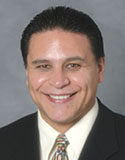Message from the CEO of Bronx-Manhattan North Association of Realtors: Commercial vacancy bills - by Eliezer Rodriguez

BMNAR
The prevalence of vacant storefronts in New York City is moving the state and the city council to propose two bills each to solve the problem. Each bill will impose a fee on property owners.
Assemblymember Linda Rosenthal is the sponsor of NY-A6997. This bill will impose a fee of 1% of the assessed value on a vacant commercial property that remains vacant for more than six months. The fee would be paid every 30th day that the property remains vacant.
State senator Robert Jackson is the sponsor of Senate Bill S5166. His bill seeks to impose a commercial vacancy tax in New York City on the property that includes a vacant or abandoned storefront. Unlike NY-A6997, the 1% of the tax of the assessed value of the property is applicable to storefronts that have been vacant for less than six months. This bill would be entirely unfair to property owners because finding a tenant after a commercial lease expires takes time.
Both A6997 and S5166 would direct revenues from the fee to the State General Fund and impose additional costs on property owners and small businesses in New York City. This is counterproductive, as higher costs increase the likelihood of small businesses vacating a commercial property. Moreover, any tax or fee imposed on a property owner with a vacant storefront, would be passed on to other businesses leasing from the property owner. This would unfairly penalize small businesses for vacant storefronts, thereby hurting their bottom lines.
Councilmember Rosenthal is the sponsor of Int.1473 and councilmember Rose is the sponsor of Int. 226. Both of these bills would require the registration of the property as being vacant. Int. 1473 would require the owners of the commercial properties to register the storefront properties that have been unoccupied for 90 consecutive days. Owners who fail to register would be subject to a civil penalty of $1,000 for every week until they register. Int. 226 would require the registration of property that has been vacant for one year or more with the NYC Department of Housing Preservation and Development. Owners who fail to register would be subject to a fine of between $100 and $500 per week.
Property owners have no incentive to keep their commercial properties vacant as they lose revenue the longer their property remains vacant. During the vacancy period, the owners are paying property taxes and such additional tax would amount to double taxation.
In a recent report by the Real Estate Board of New York (REBNY), the average asking rents for available spaces have dropped in 12 out of 17 commercial corridors in Manhattan from spring 2018 to spring 2019. Moreover, on Madison Ave. the prices have declined by as much as 25%. Once again, the market forces are finding ways to correct itself.
I may be wrong, but I do not believe a comprehensive study was ever done in the five boroughs of New York City to measure the vacancy rate or the reasons for the vacancies. More time is needed to study this issue and time to address the finding. Moving to attach fees on commercial vacancies without fully understanding the problem is not a good faith attempt to finding a reasonable solution that is palatable to all interested parties.
Before closing, if you are broker with an office in Upper Manhattan, we have a great membership opportunity for you. For more information, please call (718) 892-3000. And remember, “There’s no place like home.”
Eliezer Rodriguez, Esq. is the chief executive officer of The Bronx-Manhattan North Association of Realtors, Bronx, N.Y.
AmTrustRE completes $211m acquisition of 260 Madison Ave.


Behind the post: Why reels, stories, and shorts work for CRE (and how to use them) - by Kimberly Zar Bloorian

AI comes to public relations, but be cautious, experts say - by Harry Zlokower

Strategic pause - by Shallini Mehra and Chirag Doshi









.jpg)

.gif)